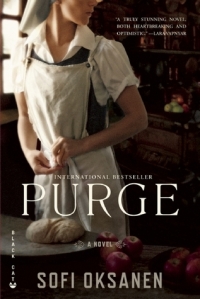 Purge, a novel by Sofi Oksanen (Trans. from the Finnish by Lola Rogers). New York: Black Cat, Grove/Atlantic, Inc., 2010. (Original work Puhdistus published 2008)
Purge, a novel by Sofi Oksanen (Trans. from the Finnish by Lola Rogers). New York: Black Cat, Grove/Atlantic, Inc., 2010. (Original work Puhdistus published 2008)
Purge depicts the bitter realities of Estonian life during the post-war Russian occupation and Stalinist purge, through the tragedy of one family. The setting is Läänemaa, a western county of Estonia, bordering the Baltic Sea. Chapters shift primarily between 1992 and the immediate post-war years, with a few chapters set before and during the war to show the early lives of two sisters, Aliide and Ingel.
Although we first meet Aliide as an older woman living alone in 1992, the initial chapter is a single page from the diary of Hans Pekk, dated 1949, with the recurring title “Free Estonia!” He complains of his isolation, but is irritated by Aliide:
“Liide’s always trying to get closer to me. Why won’t she leave me alone? She smells like onions.
What’s keeping the English? And what about America? Everything’s balanced on a knife edge–nothing is certain.
Where are my girls Linda and Ingel? The misery is more than I can bear.”
The significance of his words only becomes clear as the story unfolds in the interplay of present events and family history. Each chapter quotes a symbolically resonant sentence from that chapter; the first one in 1992 is called “The Fly Always Wins” and grimly reveals Aliide’s state of mind as she obsessively tries to rid her kitchen of flies and their eggs. The imagery of flies and being like a fly on the wall will recur throughout the book. She becomes aware that a teenage girl is outside, lying in a disheveled state under a tree in Aliide’s yard. Despite her poor condition, she is alive and Aliide brings her inside, begins to care for her, and questions her reason for being there. The girl, named Zara, is Russian, but able to speak accented Estonian. She has made the trip from Tallinn, looking for her grandmother’s family, and possesses one treasure, a picture of her grandmother and her great-aunt together as young girls. Aliide recognizes herself and her sister Ingel but, to the girl, she denies having a sister. Zara also lies to Aliide about her past, but voices her very real terror that her abusive “husband” will be coming to look for her and she must hide from him.
The separate histories of Aliide and Zara are disclosed gradually in flashbacks. Aliide could not recall a time when she did not feel bested and loved less than her prettier, sweeter, more capable sister Ingel. Ingel cooked and preserved jam better and was altogether more satisfying a housekeeper and helper to their parents. When handsome peasant farmer Hans Pekk came to their house, Aliide fell in love with him on sight, but he, of course, fell in love with Ingel, and they were married–on a day that seemed to twist the knife in Aliide’s heart. The three of them lived together in the family home, even after their parents were gone, and the affectionate married couple had a baby daughter, Linda, compounding Aliide’s jealous resentment. War separated them from Hans but the disaster didn’t end after the war. As in other Eastern European countries, German occupation was followed by Soviet occupation, and the brutalities continued. Hans was a freedom fighter (“Free Estonia”), but he was hunted by the Soviet police and began a period of hiding in their house in a closet concealed behind a cabinet–a horrible, lonely existence. Aliide and Ingel were interrogated and tortured, and little Linda was also abused. In her mind, Aliide became dissociated from her body, as if she herself were no longer there, except as a fly buzzing in the room. After unspeakable degradations, Aliide continued to maintain that Hans had died in 1945, and she was eventually returned to their house. Ingel and Linda disappeared. We surmise they have been deported to Siberia. In her own mind, Aliide now had Hans to herself–he was certainly in her power, since she could reveal him at any time. What would become of them both? Fueled by terror, Aliide sought relative safety in a marriage with a Communist party official, Martin Truu, and she became an occasional informant. She still called herself Aliide Truu in 1992.
Zara, we learn from flashbacks, has been a victim of sex-trafficking in Vladivostok. Her captors were ex-KGB agents seeking to make money after the fall of the Soviet system. She persuaded them to make a trip to Tallinn to find more lucrative clientele, and from there she escaped to find her grandmother’s home in Läänemaa. But her pursuers are not far behind, and when they catch up with her, arriving at the house, the only person standing between her and a return to her former life of sexual slavery is Aliide. What will Aliide decide to do?
The last section of the book includes KGB reports that shed some light on the events in the book, but still leave many questions unanswered.
Purge was the No. 1 bestseller in Finland when it appeared, and it has been translated into 38 languages. It has garnered numerous literary prizes, most notably the Finlandia Prize, the Nordic Council Literary Prize, and the 2010 FNAC prize in France, where it marked the first time that this prestigious award went to a foreign author. With her unflinching look at the ongoing human cost of the Soviet occupation, Finnish-Estonian author Sofi Oksanen is now a major young literary figure in Europe. Her latest book is called When the Doves Disappeared, which I first discovered after reading a review of it at The Book Binder’s Daughter. I decided to review Oksanen’s earlier novel first, but hope to return with a review of this important new novel as well.
Purge captures the corrosive effects of jealousy with stark insight. It shows the devastating effects of torture, prolonged fear of reprisal, and sexual brutality, in explicit detail. With this warning to potential readers, I recognize the author’s distinctive achievement and recommend it to anyone wishing to gain a deeper understanding of this human tragedy, past and present.
Related links:




What a great review! I think I will have to go back and read this one as well.
LikeLiked by 1 person
And likewise, I need to read When the Doves Disappeared! Purge is so brilliantly constructed, I’m sure you would like it too.
LikeLike
Sounds like a difficult book to read, but it is a time and place that I would like to know more about, and, as you put it, “the corrosive effects of jealousy,” transcend time and place.
Interesting review. Glad to see your reading project continues 🙂
LikeLiked by 1 person
You’re right, the subject matter and events were definitely painful to read about, but it was compelling nevertheless. It has that quality of true art which you describe so well–it informs about the specific historical place and time, and also transcends them in the basic human elements.
LikeLike
When I read Estonia, I automatically think Arvo Pärt, this amazing composer. I was fortunate to hear one of his works live last week in Chicago. Maybe you need to add a Music tag to your blog, lol!! Just in case you don’t know him, you really need to try. Maybe start with the Miserere. There’s a great book by Peter C. Bouteneff, called Out of Silence, that explains how Orthodoxy inspires his work
LikeLiked by 1 person
This is a great idea! I definitely should add a music tag, since I plan to write about Sibelius. I’m interested in all the arts, such as Scandinavian architecture and design–something they do so well. This blog lets me explore more aspects of history, culture, arts, religion, and of course–literature! Thanks so much for the recommendation of this composer, a work to start with, and a book about him. And thanks for visiting this blog!
LikeLike